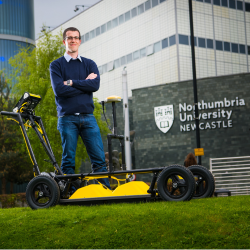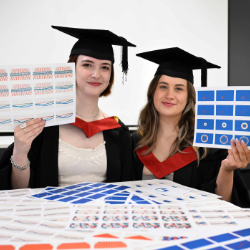-
Study
-
UCAS Clearing 2024
- Clearing Courses
- The Clearing Process
- UCAS Tariff Points
- Clearing 2024 FAQs
- Confirmation
- Clearing Virtual Event
-
Undergraduate
- Search for a Course
- Undergraduate Open Day & Events
- Application Guides
- Northumbria University UCAS Exhibitions
- Foundation Years
- Undergraduate Fees & Funding
- School & College Outreach
- Continuing Professional Development
-
Postgraduate
- Postgraduate Study Degree
- Postgraduate Research Degrees
- Postgraduate Open Days and Events
- Postgraduate Fees & Funding
- Flexible Learning
- Thinking about a Masters?
- Continuing Professional Development
- Change Direction
-
Student Life
- The Hub - Student Blog
- Accommodation
- Life in Newcastle
- Support for Students
- Careers
- Information for Parents
- Students' Union
- Northumbria Sport
-
-
International
International
Northumbria’s global footprint touches every continent across the world, through our global partnerships across 17 institutions in 10 countries, to our 277,000 strong alumni community and 150 recruitment partners – we prepare our students for the challenges of tomorrow. Discover more about how to join Northumbria’s global family or our partnerships.
View our Global Footprint-
Applying to Northumbria
- European Union
- Our London Campus
- Northumbria Pathway
- International Events
- Entry Requirements and Country Representatives
- Regional Offices
-
Northumbria Language Centre
- Faculty Requirements
- Acceptable English Requirements
- Pre-Sessional English and Study Skills
- Academic Language Skills Programmes (ALS)
-
International Fees, Funding & Scholarships
- International Undergraduate Fees
- International Undergraduate Funding
- International Masters Fees
- International Masters Funding
- International Postgraduate Research Fees
- International Postgraduate Research Funding
- International Money Matters
-
Life at Northumbria
- International student support
- Careers
-
International Mobility
- Current Northumbria Students
- Incoming Exchange Students
-
-
Business
Business
The world is changing faster than ever before. The future is there to be won by organisations who find ways to turn today's possibilities into tomorrows competitive edge. In a connected world, collaboration can be the key to success.
More on our Business Services -
Research
Research
Northumbria is a research-rich, business-focused, professional university with a global reputation for academic quality. We conduct ground-breaking research that is responsive to the science & technology, health & well being, economic and social and arts & cultural needs for the communities
Discover more about our Research -
About Us
-
About Northumbria
- Our Strategy
- Our Staff
- Place and Partnerships
- Student Profiles
- Alumni Profiles
- Leadership & Governance
- Academic Departments
- University Services
- History of Northumbria
- Contact us
- Online Shop
-
-
Alumni
Alumni
Northumbria University is renowned for the calibre of its business-ready graduates. Our alumni network has over 237,000 graduates based in 178 countries worldwide in a range of sectors, our alumni are making a real impact on the world.
Our Alumni - Work For Us
What will I learn on this module?
This module offers students a forum to develop academic skills in close reading and analysis. A range of texts are examined within a reading-focussed workshop, including: the novel, short stories, poetry, plays, journalism, academic essays and online media such as blogs and flash fiction. Students are exposed to a range of writing in order to consider and develop their own reading practices. The discursive workshops develop speaking, listening, and critical skills through participation in classroom activities. The module prepares students for work at degree level, encouraging them to become independent learners in a supportive environment.
How will I learn on this module?
This is a workshop-based module, involving large and small group discussion facilitated by the tutor through prepared exercises (such as close reading). In semester 1 the tutor selects the texts and lead the workshop; in the second semester students choose the texts and initiate the discussion, with support from the module tutor. Throughout the module your ability to think and respond critically to texts will be nurtured through your own preparation and through group discussions, informed by critical reading in related secondary materials (see indicative reading below).
How will I be supported academically on this module?
Workshops are supported by a dedicated and integrated Bb site; by a detailed module guide that clearly sets out in detail the structure of workshops and topics; by detailed bibliographies that draw upon the latest scholarship in the field of English Literature; and by discussion with the module tutor in class. The module tutor will provide expertise, guidance and advice within the workshops and in tutorials. Debate is structured through workshop exercises in order to enable students to develop skills in close reading and informed analysis. Staff office hours are available for you to sign up for tutorials and assist in the development of speaking, listening, and critical skills gained through participation in classroom activities. Feedback on assignments provide opportunities for learning in advance of the subsequent assessment on this module (and others in the programme).
What will I be expected to read on this module?
All modules at Northumbria include a range of reading materials that students are expected to engage with. The reading list for this module can be found at: http://readinglists.northumbria.ac.uk
(Reading List service online guide for academic staff this containing contact details for the Reading List team – http://library.northumbria.ac.uk/readinglists)
What will I be expected to achieve?
Knowledge & Understanding:
1 An introductory knowledge and understanding of issues raised by a diverse range of texts and contexts
Intellectual / Professional skills & abilities:
2 Introductory intellectual skills in employing theoretical and critical material in relation to literature;
3 Introductory abilities in close and interdisciplinary textual analysis
4 Confidence to articulate an argument verbally and defend it rigorously
Personal Values Attributes (Global / Cultural awareness, Ethics, Curiosity) (PVA):
5 Introduction to debates around class, race, gender, religion, nationality and sexuality and textual interventions in those debates.
How will I be assessed?
• Blog Post (reflecting on the experience of studying literature at university) = 500words – summative
MLOs 2, 3, 4
• Short written assignment reflecting on ‘Literature’ and employing skills in close reading of texts – 2x500words - summative
MLOs 1, 2, 3, 5
• Comparative review of two texts = 1,500 words – summative
MLOs 1, 2, 3, 4, 5
Feedback on work will be delivered according to the existing protocols of the Humanities Department, with comments on feedback sheets. Feedback will encourage a reflexive approach, and ensure students feel confident about approaching their summative assessment. The students will also complete a Self-Evaluation Document for each essay as part of the feedback procedure.
Pre-requisite(s)
None
Co-requisite(s)
EL4001 and EL4002
Module abstract
Talking Texts is effectively a reading workshop which aims to stimulate and enhance your love of reading, through the examination of a diverse range of texts chosen by the tutor and by the students. Its unique student-led structure means you will be encouraged to follow your interests, while learning about and respecting others’. You can expect your reading habits and tastes to change, as you encounter new authors, new ideas, and new forms of writing.
This module develops your skills in analysis, communication and academic writing, and is assessed by short assignments, an online blog and a comparative analysis of two texts.
Course info
UCAS Code Q320
Credits 20
Level of Study Undergraduate
Mode of Study 3 years Full Time or 4 years with a placement (sandwich)/study abroad
Department Humanities
Location City Campus, Northumbria University
City Newcastle
Start September 2024 or September 2025
All information is accurate at the time of sharing.
Full time Courses are primarily delivered via on-campus face to face learning but could include elements of online learning. Most courses run as planned and as promoted on our website and via our marketing materials, but if there are any substantial changes (as determined by the Competition and Markets Authority) to a course or there is the potential that course may be withdrawn, we will notify all affected applicants as soon as possible with advice and guidance regarding their options. It is also important to be aware that optional modules listed on course pages may be subject to change depending on uptake numbers each year.
Contact time is subject to increase or decrease in line with possible restrictions imposed by the government or the University in the interest of maintaining the health and safety and wellbeing of students, staff, and visitors if this is deemed necessary in future.
Useful Links
Find out about our distinctive approach at
www.northumbria.ac.uk/exp
Admissions Terms and Conditions
northumbria.ac.uk/terms
Fees and Funding
northumbria.ac.uk/fees
Admissions Policy
northumbria.ac.uk/adpolicy
Admissions Complaints Policy
northumbria.ac.uk/complaints














